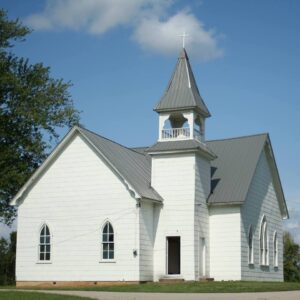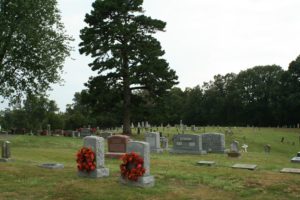Missouri Statehood and Early Settlement
According to Campbell’s Gazetteer of Missouri published in 1875, the first known settlement in the Stoddard county area was around 1823, two years after Missouri became a state, by William Taylor and Peter Cryts. Stoddard county was officially organized on January 2, 1835, however settlement of the area remained slow until 1853 when the Federal government passed the “Graduation Act” opening Federal Lands into the market. This Act proved successful as many settlers from Tennessee, Kentucky, Southern Indiana and Illinois migrated to the area, buying land over the course of the next several years.
Location, Location, Location
The landscape of Stoddard county was very diverse with some areas full of timber, some land excellent for farming and in the northeast corner of the county was an area called “Big Field” which consisted of around 2,000 acres of swampland. Bloomfield became the county seat in 1856 and was located in the high lands of the center of the county. Nineteen miles northeast of Bloomfield, was a settlement called Lakeville, which had an approximate population of 200 people and included grist/saw mills, four stores and two churches in the early 1870’s. This settlement would eventually become known as Advance in 1897.
Tilman? Where’s That?
Pleasant Hill Cemetery is often referred to as “Tilman”, a township that no longer exists. But, where exactly was Tilman? This map from A History of Missouri by Louis Houck published in 1908, shows Tillman in relation to the city of Advance (formerly known as Lakeville) and Bloomfield. The major travel route through this area was known as the Cape-Bloomfield road.
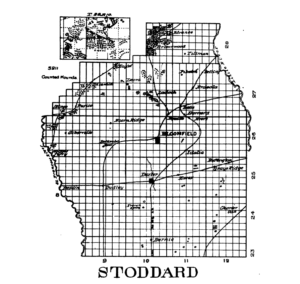
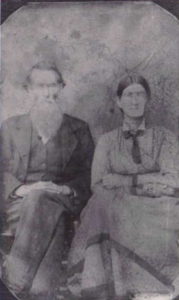
But just who was this township named after? The township of Tilman was named after Civil War veteran, John Nicholas Tilman, who after serving in the Union Army for Indiana, moved to the area between the end of the Civil War in 1865 and 1870 when he is enumerated in the census for Stoddard county. Mr. Tilman established many businesses including a saw/grist mill, grocery store, blacksmith shop and was appointed postmaster of the local post office from 1883 to 1894. In 1897, the city of Advance was incorporated, and by 1906, the Tilman post office ceased operations and was absorbed into Advance for service.
The Founding of Pleasant Hill
Further research is needed to determine exactly when Pleasant Hill church was organized, but we do know from a warranty deed dated March 3, 1886, three acres of land was purchased from prominent real estate broker, D. S. Crumb by the Board of Trustees of Pleasant Hill (William Creed, William Foster, William Bollinger and Elijah Jenkins). Soon after, the first church was built.
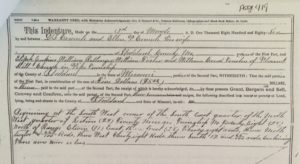
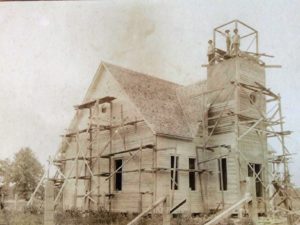
In 1910, a strong windstorm blew the original church to the ground. Church members and townsmen rallied together to quickly rebuild the church. Hired to complete the construction was John B. Creed (son of Pleasant Hill trustee William H. Creed), and his sons, Fred, Ed and Ben. Lumber was supplied from Simpson Reed’s property nearby. In a history paper written in 1965, it states the cost to build the church was $1,500.00. Creed family lore states that the money was raised by some community members running moonshine. We will probably never know if there’s any truth to that, but it does make for a fun story to tell.
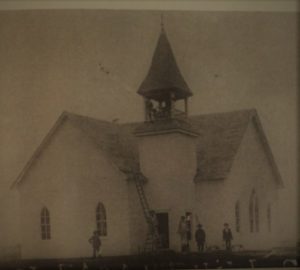
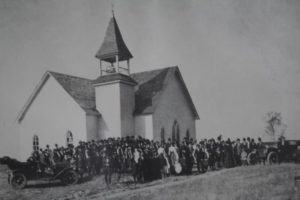 Pleasant Hill’s congregation on Dedication Day November 10, 1910.
Pleasant Hill’s congregation on Dedication Day November 10, 1910.
The church was on the Methodist Episcopal – South circuit and many pastors shared their sermons through the years. In the mid 1940’s, many community members moved to nearby Bell City and the decision to cease services at Pleasant Hill was made. Unfortunately, with this lack of activity, the church and cemetery began to fall into disrepair. In 1964, the Pleasant Hill Cemetery Memorial Association was founded to provide proper care and maintenance for the church and family members who rest there. Through generosity of the family descendants, diligent fiscal responsibility of the board, and community members joining together to help maintain the grounds, Pleasant Hill remains an active cemetery to this day.
Pleasant Hill Today
Over 130 years later, Pleasant Hill strives to maintain it’s rich history. With over 1,000 recorded burials in the cemetery, the church is believed to be the last known structure of the original Tilman township. Ask any local where Tilman is, and they can (and will) gladly tell you. We hope that you will come join us at our annual Board meeting, come for a tour, or assist us in maintaining this rich history with a monetary tax-deductible donation.
